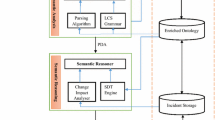Abstract
WS-BPEL (Web Service Business Process Execution Language), as an emerging workflow standard, provides a simple and effective way to construct Web Services-oriented workflows. However, to the best of our knowledge, few effort from the industry and academia has addressed the dynamic change problems of BPEL process. This paper proposes a reflective approach to solve this problem. In this paper, a formal meta-object model of process instance is defined; the behavioral consistency criterion based on this model is proposed; a set of modification primitives are given to modify the meta-object while keeping the change atomic and consistent; and in addition, the MOP is offered to provide the programming interfaces for dynamic BPEL process change.
Similar content being viewed by others
References
W M Pvd Aalst. Exterminating the Dynamic Change Bug:A Concrete Approach to Support Workflow Change[J]. Information Systems Frontiers, 2001, 3(3): 297–317.
Han Y, Sheth A, Bussler C. A Taxonomy of Adaptive Workflow Management [C]// Proceedings of Workshop of the 1998 ACM Conference on Computer Supported Cooperative Work. Seattle: ACM Press, 1998:21–29.
Reichert M, Dadam P. ADEPT flex-Supporting Dynamic Changes of Workflows without Losing Control [J]. Journal of Intelligent Information Systems, 1998, (10): 93–129.
Reichert M, Dadam P. A Framework for Dynamic Changes in Workflow Management Systems[C]//Proceedings of the 8th International Conference on Database and Expert Systems Applications (DEXA-97). Los Alamitos: IEEE Computer Society, 1997: 42–48.
Casati F, Ceri S, Pernici B, et al. Workflow Evolution [C]//Proceedings of 15th International Conference on Conceptual Modeling. Berlin: Springer-Verlag, 1996.
Jablonski S, Bussler C. Workflow Management: Modeling Concepts, Architecture, and Implementation [M]. London: International Thomson Computer Press, 1996.
Casati F, Ilnicki S, Jin L, et al. Adaptive and Dynamic Service Composition in eFlow[C]//Proceedings of the 12th International Conference on Advanced Information Systems Engineering. Berlin: Springer-Verlag, 2000.
Web Services Business Process Execution Language Version 2.0[EB/OL]. [2007-01-06]. http://www.oasis-open.org/apps/org/workgroup/wsbpel/ .
Curbera F, Khalaf R, Leymann F, et al. Exception Handling in the BPEL4WS language[C]// Busines Process Management: International Conference. Berlin: Springer-Verlag, 2003: 276–290.
Edmond D, Hofstede A. A Reflective Infrastructure for Workflow Adaptability [J]. Data & Knowledge Engineering, 2000, 34(3): 271–304.
Wang Haibo, Han Yanbo. Computational Reflection and Its Application in Adaptive Workflow Management[J]. Computer Research and Development, 2003, 40(11):1537–1546(Ch).
Maes P. Concepts and Experiments in Computational Reflection[C]//Proceedings of ACM Conference on Object-Oriented Programming, Systems, Languages and Applications (OOPSLA’87). Orlando: ACM Press, 1987: 147–155.
Zhou Mingtian, Wang Minyi, Yao Shaowen. A Workflow Instance Migration Approach Based on the Extended-Task-Structures[J]. Journal of Software, 2003, 14(4):757–763(Ch).
Rinderle S, Reichert M, Dadam P. Evaluation of Correctness Criteria for Dynamic Workflow Changes[C]//Business Process Management: International Conference. Berlin: Springer-Verlag, 2003.
Kiczales G, Des Rivieres J, Bobrow D G. The Art of the Metaobject Protocol[M]. MA: MIT Press, 1991.
Jia Xiangyang. A Reflective Approach for Evolution of BPEL Business Process [D]. Wuhan: State Key Laboratory of Software Engineering, Wuhan University, 2005.
Author information
Authors and Affiliations
Corresponding author
Additional information
Foundation item: Supported by the National Natural Science Foundation of China(60473066, 60773006) and the National High Technology Research and Development Program of China(863 Program)(2006AA012168)
Biography: JIA Xiangyang (1972–), male, Ph. D. candidate, research directions: software engineer, service-oriented software engineer, workflow.
Rights and permissions
About this article
Cite this article
Jia, X., Ying, S., Liang, Z. et al. A reflective approach for dynamic change of BPEL process. Wuhan Univ. J. Nat. Sci. 13, 165–172 (2008). https://doi.org/10.1007/s11859-008-0208-z
Received:
Published:
Issue Date:
DOI: https://doi.org/10.1007/s11859-008-0208-z




